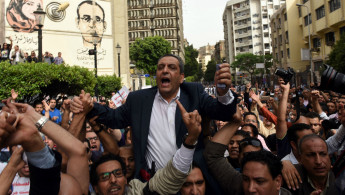Egyptian press union chief sentenced to two-year jail stint
An Egyptian court on Saturday sentenced the head of the country’s journalists union and two further board members to two years in prison while additionally handing each of them fines of around $650 for harbouring two wanted journalists.
The verdict against Yahia Qalash, and colleagues Gamal Abd el-Raheem, the journalist union’s scretary-general, and Khaled el-Balshy, an editor of the newspaper Al-Badaiah, comes after a seven month trial.
In April, security forces raided the press syndicate’s offices in an attempt to arrest two journalists wanted in connection with protests over President Abdel Fatteh al-Sisi’s decision to transfer sovereignty over two strategic Red Sea Islands from Egypt to Saudi Arabia.
The move at the time infuriated journalists in Egypt who staged protests demanding the interior minister’s resignation and a presidential apology. Neither came, instead Qalash and his two colleagues were detained, questioned and later charged with providing shelter to the two wanted journalists, Amr Badr and Mahmoud el-Sakka, who both wrote for January Gate, a website known to be critical of some of President Sisi’s policies.
Despite arresting the three journalist union members on charges of sheltering fugitives of the state, Egypt’s interior ministry claimed at the time that police forces had not even entered the syndicate’s offices by force.
“The ministry of interior affirms that it did not raid the syndicate or use any kind of force in arresting the two, who turned themselves in as soon as they were told of the arrest warrant,” the ministry said at the time.
In May, Reporters Without Borders (RWB) slammed the arrest and detention of Qalash and his fellow syndicate members as “disturbing” stating at that time that the “crisis” illustrated that “the regime is stopping at nothing in its campaign to intimidate the media.”
Egypt, currently in the midst of dire economic straits, is regularly criticised by rights groups for clampdowns on civil liberties and press freedoms. In RWB’s 2016 World Press Freedom Index Egypt ranked 159th of 180 countries.
Agencies contributed to this report





 Follow the Middle East's top stories in English at The New Arab on Google News
Follow the Middle East's top stories in English at The New Arab on Google News
![Israeli forces ordered bombed Gaza's Jabalia, ordering residents to leave [Getty]](/sites/default/files/styles/image_330x185/public/2176418030.jpeg?h=a5f2f23a&itok=_YGZaP1z)

